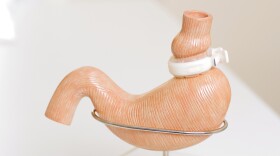Nancy Shute
-
People considering weight-loss surgery haven't had much evidence on long-term risks or benefits. A study finds lower death rates after surgery, even for people who were older and less healthy.
-
Lots of children have smartphones tucked under the pillow or on the nightstand. That may be enough to compromise sleep and make children feel less rested, a study finds.
-
Every state offers quit lines and other aids to help smokers end the habit. Using both telephone and online aids works best, a study finds.
-
In a year filled with gripping health stories, here are the ones that were the most popular with Shots readers. Think beauty pageant queens, pronouns and Ebola.
-
Public health has a way of slipping off the radar when people aren't scared about Ebola or anthrax. But that doesn't mean the threats go away. And most states aren't prepared for the next one.
-
What are the odds that you'll get a false positive when you get a mammogram? How likely is it that it will detect cancer? Here's one way to look at it.
-
Lipid metabolism may not sound sexy, but it's how you fit into that smaller pair of jeans. And when the fat says farewell, it has to go somewhere. Only some of it winds up in New Jersey.
-
Three weeks of radiation works just as well as six weeks for most women with early stage breast cancer. But doctors have been slow to make that switch. Money may be one big reason why, a study says.
-
Why is it that you can share photos so easily online but you can't get a doctor to upload your MRI? An experiment to let patients see and share their scans gets rave reviews from early adopters.
-
Citing reduced risk of HIV and other sexually acquired diseases, the federal agency says health care providers should discuss circumcision with men as well as parents of infants and teen boys.





